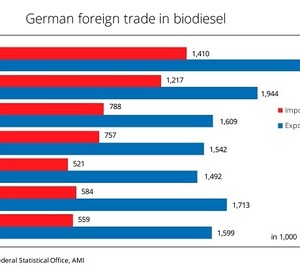German biodiesel exports of 2.3 million tons in 2019 break record

March 4, 2020
BY UFOP
German foreign trade in biodiesel was very brisk last year. The total volume of 3.7 million metric tons (1.1 billion gallons) exceeded the previous year's level by nearly 20 percent.
German foreign trade in biodiesel reached new record levels in 2019, both in imports and exports. Above all, exports were strikingly high. According to the German Federal Statistical Office, they amounted to 2.3 million tons (690.5 million gallons), cracking the mark of 2 million tons for the first time. This translates to an 18 percent, or 346,000 ton (103.9 million gallons), rise from the previous year.
The Union zur Förderung von Oel- und Proteinpflanzen e.V. has noted that Germany is the most important country in the European Union to produce and market biodiesel, thus safeguarding the country’s rapeseed production. The association has complained that although, in purely arithmetic terms, the entire German rapeseed harvest goes into biodiesel production, there is no positive impact on ex-farm prices. It remains to be seen if the quota of greenhouse gas emission reduction, which was raised from 4 percent to 6 percent at the beginning of 2020, will result in the need to cut exports.
Advertisement
However, the import-export balance of nearly 900,000 tons (270.2 million gallons) of biodiesel shows that Germany is virtually exporting the corresponding greenhouse gas reduction potential, UFOP has pointed out. In view of the sectoral obligations under climate change legislation that will apply from 2021 onwards, this potential should be used at the national level. According to UFOP, it is foreseeable that the transport sector will be behind target. Consequently, tax money will be used to purchase the required emission certificates from other member states, UFOP has criticized. As an alternative, the greenhouse gas emission reduction targets could be gradually raised to fully exploit the national climate change mitigation potential.
Advertisement
Related Stories
Montana Renewables LLC has delivered its first shipment of 7,000 gallons of SAF to Dearborn, Michigan's Buckeye Pipeline facility. From there, the fuel will be transported to the Detroit Metropolitan Airport via pipeline for use by Delta Air Lines.
NYC took a monumental step towards clean air and a sustainable future on Jan. 11 with the grand opening of the city's first retail fuel station dispensing renewable diesel. The project is a collaboration between Sprague and Sonomax.
The USDA on Jan. 11 awarded $19 million under the Higher Blend Infrastructure Incentive Program. The grants will support projects in 22 states to expand the availability of higher ethanol and biodiesel blends.
Jet Aviation partners with World Fuel Services to offer SAF in Bozeman, Montana, and Scottsdale, Arizona
Jet Aviation announced on Dec. 22 that it has signed an agreement with World Fuel Services to secure and offer sustainable aviation fuel (SAF) on-site at its FBOs in Bozeman, Montana, and Scottsdale, Arizona, effective immediately.
Neste has partnered with Coleman Oil Company, a leading provider of fuels, biofuels, lubricants, and related products, to enable cities and businesses to have easier access to Neste MY Renewable Diesel in the state of Washington in the U.S.
Upcoming Events










